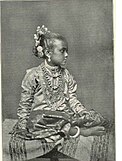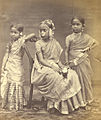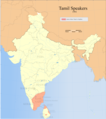The Tamils portal
The Tamil people, also known as Tamilar (Tamil: தமிழர், romanized: Tamiḻar, pronounced [t̪amiɻaɾ] in the singular or தமிழர்கள், Tamiḻarkaḷ, [t̪amiɻaɾɡaɭ] in the plural), Tamilians, or simply Tamils (/ˈtæmɪlz, ˈtɑː-/ TAM-ilz, TAHM-), are a Dravidian ethnolinguistic group who natively speak the Tamil language and trace their ancestry mainly to India's southern state of Tamil Nadu, to the union territory of Puducherry, and to Sri Lanka. The Tamil language is one of the world's longest-surviving classical languages, with over 2000 years of Tamil literature, including the Sangam poems, which were composed between 300 BCE and 300 CE. People who speak Tamil as their mother tongue and are born in are considered Tamils.
Tamils constitute 5.9% of the population in India (concentrated mainly in Tamil Nadu and Puducherry), 15% in Sri Lanka (excluding Eelam Moors), 7% in Malaysia, and 5% in Singapore. From the 4th century BCE, urbanisation and mercantile activity along the western and eastern coasts of Tamilakam -- what is today Kerala and Tamil Nadu -- led to the development of four large Tamil empires, the Cheras, Cholas, Pandyas, Pallavas, and velirs and a number of smaller states, all of whom were warring amongst themselves for dominance. The Jaffna Kingdom, and vanni chieftaincies inhabited by Eelam Tamils, was once one of the strongest kingdoms of Sri Lanka and controlled much of the north of the island. (Full article...) Selected article -Sri Lankan Tamil nationalism is the conviction of the Sri Lankan Tamil people, a minority ethnic group in the South Asian island country of Sri Lanka (formerly known as Ceylon), that they have the right to constitute an independent or autonomous political community. This idea has not always existed. Sri Lankan Tamil national awareness began during the era of British rule during the nineteenth century, as Tamil Hindu revivalists tried to counter Protestant missionary activity. The revivalists, led by Arumuga Navalar, used literacy as a tool to spread Hinduism and its principles. The reformed legislative council, introduced in 1921 by the British, was based on principles of communal representation, which led the Tamils to realize that they were the minority ethnic group and that they should be represented by a member of their own community. It was under this communal representation that Tamil national awareness changed to national consciousness—a less passive state. They formed a Tamil political party called the All Ceylon Tamil Congress (ACTC). In the years leading to Sri Lankan independence, political tension began to develop between the majority Sinhalese and minority Tamil communities as the ACTC, citing the possibility of the majority Sinhalese adopting a dominant posture, pushed for "fifty-fifty" representation in parliament. This policy would allot half the seats in parliament to the Sinhalese majority and half to the minority communities: Ceylon Tamils, Indian Tamils, Muslims and others. (Full article...)General imagesSelected biography -Ranganathan Madhavan (born 1 June 1970) credited as R. Madhavan, informally known as Maddy, is an Indian actor, writer, director, and producer who predominantly appears in Tamil and Hindi films. Over the course of his career, he has been a recipient of several accolades including one National Film Award, four Filmfare Awards South, two Tamil Nadu State Film Awards and five SIIMA Awards. Currently, he serves as the President of Film and Television Institute of India (FTII), Pune. Madhavan gained recognition in Tamil cinema by starring in Mani Ratnam's romantic drama film Alai Payuthey (2000). He soon developed an image as a romantic hero with notable roles in two of the highest-grossing Tamil films of 2001, Gautham Vasudev Menon's directorial debut Minnale and Madras Talkies' Dumm Dumm Dumm. He had further box-office hits with films, such as Run (2002), Jay Jay (2003), Thambi (2006) and Rendu (2006) and gained praise for his performances in Kannathil Muthamittal (2002), Anbe Sivam (2003), Nala Damayanthi (2003) and Aayutha Ezhuthu (2004). In the mid-2000s, Madhavan also actively pursued a career in Hindi films, by appearing in supporting roles in three highly successful productions, Rakeysh Omprakash Mehra's Rang De Basanti (2006), Mani Ratnam's biopic Guru (2007) and Rajkumar Hirani's comedy-drama 3 Idiots (2009), which went on to become the highest-grossing Indian film of all time at the time of its release. During this time, Madhavan also simultaneously continued working in Tamil cinema with the films Evano Oruvan (2007) and Yavarum Nalam (2009). (Full article...)CategoriesTopicsTamil People Countrywide: India • Sri Lanka • Canada • Malaysia • Singapore • South Africa • England Related Ethnic Groups: Brahui • Gond • Kannadiga • Khonds • Kodava • Oraon • Malayali • Telugus • Tuluvas Related indigenous Groups: Badagas • Toda • Kuruba
See also: List of Tamil people, Tamil script, Tamil Script Code for Information Interchange Related portalsWikiProjectsThings to do
Associated WikimediaThe following Wikimedia Foundation sister projects provide more on this subject:
Discover Wikipedia using portals
Purge server cache |
One thought on “Cannabaceae”
Leave a Reply
You must be logged in to post a comment.































































Well, that’s interesting to know that Psilotum nudum are known as whisk ferns. Psilotum nudum is the commoner species of the two. While the P. flaccidum is a rare species and is found in the tropical islands. Both the species are usually epiphytic in habit and grow upon tree ferns. These species may also be terrestrial and grow in humus or in the crevices of the rocks.
View the detailed Guide of Psilotum nudum: Detailed Study Of Psilotum Nudum (Whisk Fern), Classification, Anatomy, Reproduction